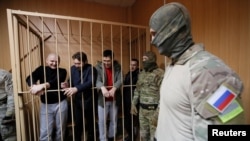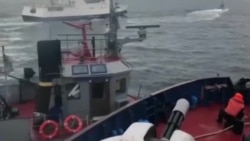On June 27, Russian Foreign Ministry spokesperson Maria Zakharova said via Facebook that while she was on vacation, she has been compelled to respond to numerous inquiries regarding Kyiv’s refusal to accept Moscow’s offer to free Ukrainian sailors.
Zakharova was referring to the 24 Ukrainian sailors who, along with their three ships, were captured by Russia last November while heading to the Kerch Strait, the only passage between the Black Sea and the Sea of Azov via international waters.
In her Facebook post, Zakharova accused Kyiv of using the sailors to “blackmail” Russia while “caring nothing” about their fate.
The Russian state news agency RIA Novosti published a piece on Zakharova’s Facebook comments with the headline: “Kyiv has refused to discuss the question of the release of the sailors, said Zakharova.”
While Zakharova is right that Russia sent a note to Ukraine regarding the captured sailors, she mischaracterized what Russia actually proposed in the note, as well as the controversy more generally.
On May 25, the International Tribunal for the Law of the Sea (ITLOS), which is an inter-governmental organization established by the United Nations, ordered Russia to “immediately release” the 24 Ukrainian sailors and three ships without any preconditions.
On June 25, Russia’s Foreign Ministry sent notes to Ukraine and to the International Tribunal for the Law of the Sea concerning actions it was taking in response to the tribunal’s May 25 order. While the ministry did not make those notes public, on June 26 it posted a statement that included some details of Moscow’s proposal.
According to the Russian Foreign Ministry, the notes it sent to Ukraine and the tribunal “draw attention to the fact that the criminal proceedings against the 24 Ukrainian sailors are ongoing, as well as to the possibilities available under the criminal procedure legislation of the Russian Federation with regard to sailors and ships that may be at this stage involved by the Ukrainian side in order to release them.”
Responding to the Russian Foreign Ministry note, Ukraine’s Foreign Ministry accused Moscow of failing to comply with the May 25 order by the International Tribunal for the Law of the Sea. It said the Russian Foreign Ministry note contained “a cynical proposal to provide the Ukrainian side with written guarantees of Ukraine's participation in the continuation of the criminal prosecution of Ukrainian sailors in accordance with Russian law.”
The Ukrainian Foreign Ministry added that it considered “this proposal by Russia unacceptable and aggravating the dispute between Ukraine and Russia regarding the immunity of warships.” It also demanded, “that Russia, without any further conditions, comply with the Order of the International Tribunal for the Law of the Sea and immediately release the captured 24 Ukrainian sailors.”
Russia, however, is refusing to comply, insisting the international rules do not apply to this case.
Moscow insists that it captured the Ukrainian ships last November while they were “violating Russian territorial waters.” Polygraph.info has examined that claim and found it to be false.
In comments to Polygraph.info, U.S. special envoy to Ukraine Kurt Volker said Russia’s capture of the Ukrainian ships and sailors in international waters last November violated international law, and that their continued detention is illegal.
He also noted that a U.N. court (ITLOS) had ruled against Russia and demanded the immediate release of the sailors.
Volker said Russia’s “offer” to Ukraine to participate in the criminal investigation of the sailors was an affront to justice, since there was no basis to detain them in the first place, as well as an affront to the U.N. and Ukrainian sovereignty.
On June 27, Ukraine’s Foreign Minister Pavlo Klimkin posted the scanned copies of the Russian and Ukrainian notes on his Facebook page.
The Kyiv Post translated Klimkin’s post from Ukrainian to English, explaining that he had decided to share the diplomatic notes to clear up any questions and to reveal Russia’s “hidden motives,” calling Moscow's note a “trap.”
Instead of implementing ITLOS' decision, Klimkin said that Russia aims to:
- "require us to admit that our sailors could commit a crime"
- "persuade us to recognize the lawfulness of the judicial process against them under Russian law"
- "invite us to bend over to the criminal procedure code of the Russian Federation, and at the same time indirectly recognize the occupation of Crimea."







